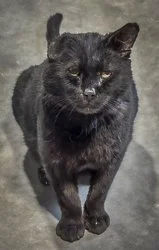An Ode to the Stray Messiah
The cat came to us dying, but he lived.
Our neighborhood, in the pinon-juniper woodland skirting the feet of the San Juans, hosts a moderately dispersed human population, but other residents abound. Deer, squirrels, rabbits, elk; coyotes, bobcats, foxes; not infrequently I follow mountain lion tracks on my morning walk. Sometimes the internet reports a bear sighting in the vicinity, though I’ve never come across any sign myself. A trio of bald eagles wintered on the ridge behind us, and in the summer prairie rattlesnakes emerge from burrows in our yard. It’s a rich community, but not a kind one to the vulnerable or infirm.
The cat appeared to us out of the brush one random day when the nights were falling into single digits and puddles stayed frozen past noon: skeletal, near blind with pus and discharge, skulking and desperate. Feral, was my first thought—but when I approached he thrust his crusty head into my hand. I left to get him food and water and he followed me, as diligent as a well-trained dog. After we assembled a place for him in our garden shed, complete with blanket and heater, he still tried to follow me to the house, but I walked him back and pointed at the gapped door and he entered without me and took up his new abode as if it had always been his. As if he knew.
Thus he entered our lives.
Once in a great while, if you are fortunate, an entity—rare as a unicorn, bright and transitory as a shooting star—will touch you, and leave you forever changed. A gift, a fulcrum, perhaps a revelation. Entity, I say, because not all are human. Maybe, even—had we eyes to see and hearts to feel—most are not.
This is not the self-congratulatory story of adopting an unfortunate creature, but a reflection on the myriad lives we overlook. Thibault—the name we gave him, signifying brave people—exhibited extraordinary qualities from that first day, even beyond managing to survive one of the coldest spells of this Colorado winter. He, like only two other cats I’ve been privileged to know, transcends the normal limitations of his species. I’ve met a handful of dogs over the years that likewise rose above the conventional understanding of doghood.
I have even, I must acknowledge, encountered a few humans who merit inclusion in this transformative fraternity.
All these shine in memory.
Such beings are scattered like windborne seeds across cultures and centuries, intersecting lives by chance or some unfathomable design. Some become seers, prophets, dreamers and visionaries—even messiahs—while others fall on barren ground where they lie unremarked and ultimately lost.
Time and timing, chance and serendipity, shape our destinies in ways we can never know. A momentary shift in our daily schedule and Thibault would have ended as a coyote’s meal or a furred and flattened stain on the roadside, another passing casualty, insignificant as the rest. He was, in any event, no more than days from death when he found us.
A fluke; a chance encounter. What story would he tell if only he were able? What chain of circumstance or misfortune threw him onto this precipitous descent? Where had he journeyed, what had he endured? Clearly he had been loved once, or he’d not be so human-attuned; just as clearly, he had been somehow severed from that idyllic past, cruelly or casually or just circumstantially.
Something we can never know.
So one wonders—one must, unless one deliberately chooses not to—how many others? Not just thrown-away cats or dogs, but humans, too: how many children languishing in refugee camps; how many homeless, so easily dismissed as human flotsam; how many washed in the rising tide of mass migrations, flights from war or poverty or persecution or just a hostile sky or season; how many, subsumed in these hordes of the nameless wounded, carry that same spark, that same potential for extraordinary transcendence, as the stray cat who staggered half-blind and toothless into our quotidian existence—and transformed it?
Metaphor abounds and lessons surround us, an encroaching army of wisdom—if we listen, if we see. If we strive to penetrate beyond the disfigured skin; to discern, beneath our differences, our commonalities: deeper than race, gender, religion, nationality—deeper even than species.
Thibault looks into my eyes in a way most cats never do: as if there is a seeking, a reaching for communion. I look back, trying just as hard to connect. Likely I can’t; likely some secret message must remain forever untransmitted, untranslated, interdicted by the gulf between species. But maybe, maybe, the real illumination rises in the attempt itself.
It’s been some time since Thibault came to us. There have been multiple trips to his Durango veterinarian. He’s still not well—still wheezing, still struggling—but he is improving. The vet tells us that there will never be a complete recovery, that in fact his condition is terminal, but we don’t know, can’t know, how long we’ll have with him. That, of course, is the great uncertainty each of us must carry through every life, every relationship: the whims of fate and hazard. What we do know is that he has, in his quiet needful way, immeasurably enriched us.
So maybe, even in the darkest times, the fundamental lesson is this: that it will always be the smallest, most unremarked kindnesses, given or received, that sustain us.
Lawrence Blair Goral
12 February 2025
Bayfield, Colorado
